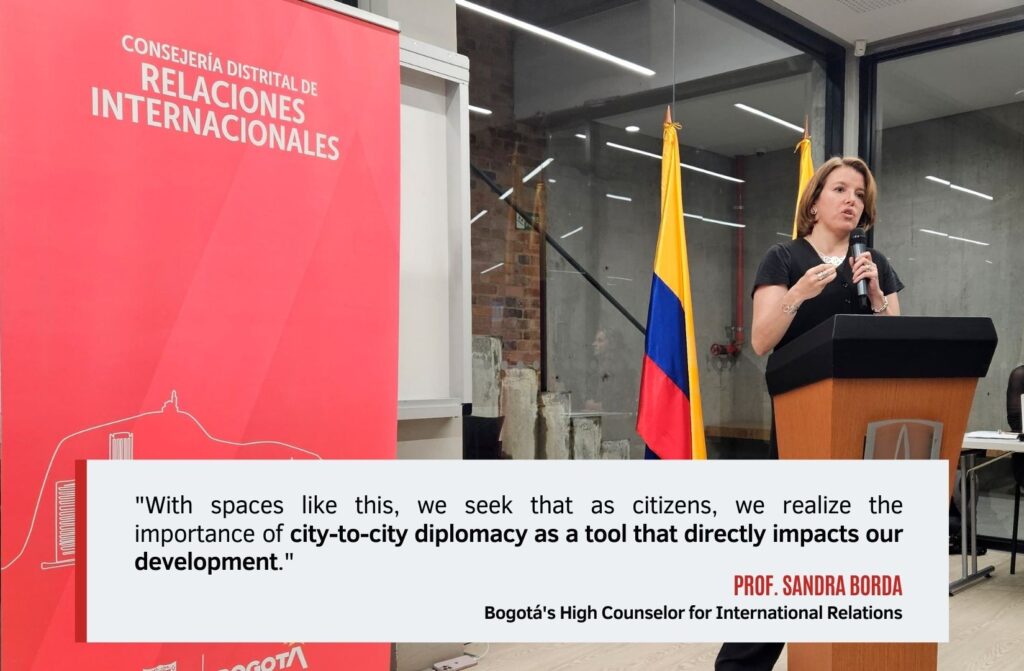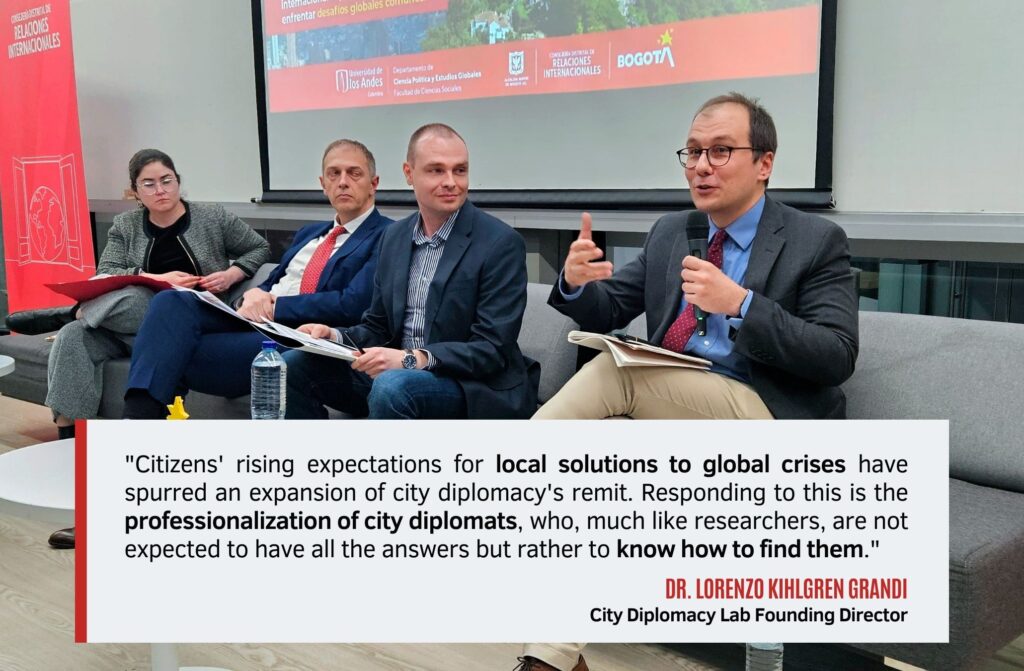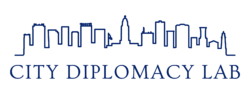On May 16, 2024, the City of Bogotá, a City Diplomacy Lab Advisory Board Member, hosted a global conference to discuss the future of city diplomacy with experts and practitioners from across the world.
Over the last few years, Bogotá has become a beacon of city diplomacy worldwide, as symbolized by the appointment of former Mayor Claudia López as UN-Habitat Ambassador for the New Urban Agenda and Metropolis President.
As new Mayor Carlos Fernando Galán assumed office in January 2024, he further upgraded the relevance given to this field, raising the status of the office charged with international relations from Department to District Council—a choice reflecting the mandate of serving as a cross-sectoral resource for the whole local administration. Sandra Borda, Professor of International Relations at the renowned Universidad de los Andes, was charged with heading the new body.
In convening the event, High Counselor Borda highlighted the importance of participatory design and management of city diplomacy, emphasizing the potential of city-academia collaboration in understanding and scaling up city diplomacy.

The meeting was divided into two panels, each dedicated to identifying the nature, opportunities, and challenges of city diplomacy today and discussing its possible future evolution.
🟡🔴#Hoy es nuestro encuentro: 'Internacionalización de las Ciudades: Estrategias y desafíos para el futuro’.
— Relaciones Internacionales Bogotá (@BogotaInter_nal) May 16, 2024
Un espacio para dialogar sobre la importancia de la diplomacia urbana como herramienta estratégica para la colaboración y el progreso de las ciudades a nivel global. pic.twitter.com/B1LQ34oUiH
The first panel highlighted the growing evidence of city diplomacy as an impactful multistakeholder process. Cristina Zambrano Restrepo, Executive Director of the Medellín Cooperation and Investment Agency, emphasized how “Internationalization has allowed us to transform our image. It was a collaborative effort involving academia, the private sector, and the public sector to change the previously negative image.”
Also central to the discussion was the strategic importance of multilevel cooperation in international relations. According to Sohaela Amiri, Senior Research Officer at the USC Center on Public Diplomacy, domestic and international politics cannot be understood separately. In this regard, Max Bouchet, City Diplomacy Lab Associate Fellow and Deputy Director for City and State Diplomacy at the Truman Center for National Policy, emphasized the importance of cities’ pedagogical role vis-à-vis their national government concerning city diplomacy.
The panelists also paid great attention to the role, spaces, and recognition of cities’ actions in global governance. According to Buenos Aires Undersecretary for International Relations Ana Ciuti, despite the great progress made by major cities around the world in their internationalization processes, there is still much to be done: “There are global challenges that have a direct impact on us as citizens. For this reason, cities need to open up more spaces in global decision-making bodies.”
The panel also included a focus on city diplomacy risks. Rodrigo Perpetuo, Executive Secretary of ICLEI South America, emphasized the importance of a strategic perspective on the part of cities in order to avoid the potentially distorting effect of conducting city diplomacy as a mere reaction to external stimuli.
In the second panel, City Diplomacy Lab Director Lorenzo Kihlgren Grandi provided insight into cities’ unfolding opportunities to pursue their global impact ambitions within multigovernmental processes such as COPs and the UNECE Forum of Mayors. He also emphasized how the city diplomat profession is evolving to cope with its expanding responsibilities.

The panel provided insight into the role of mayors as advocates for global social agendas and agents of political discourse. “They see internationalization as more than pragmatic aid or access to international resources,” stressed Jordi Vaquer, the Secretary General of the Metropolis. U.S. State Department’s Subnational Diplomacy Unit Adviser Natalia Cote-Muñoz linked this expanded role to the process of urbanization: “The accelerated process of urbanization has increased the role of cities in global issues. Many global problems are local and are very similar regardless of country.” Raffaele Marchetti, Vice Provost for Internationalization at LUISS University in Rome, emphasized the rising costs for cities that choose not to internationalize.
Counselor Borda concluded the event by stressing the importance of collective and participatory work to achieve internationalization processes that involve and engage citizens. “It is from the local level that citizens’ trust is recovered. Hence, it is important to see internationalization within an identity framework to collectively understand and build what we want to show the world and how we recognize ourselves,” she remarked.
For more information on Bogotá’s international action, visit this page.

